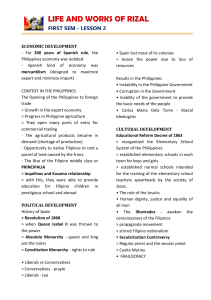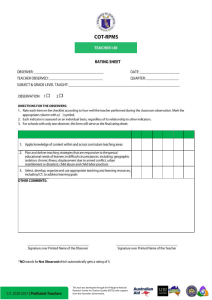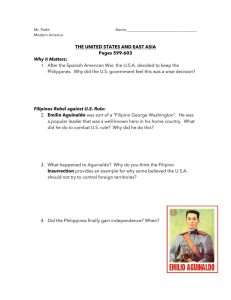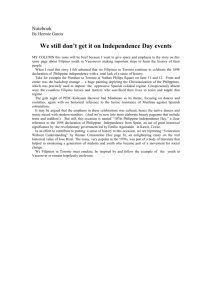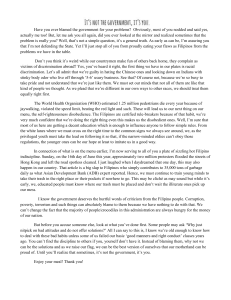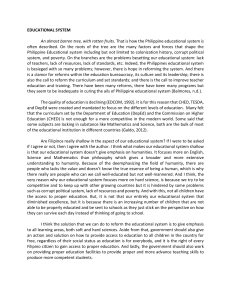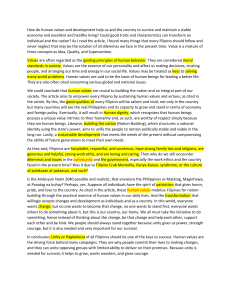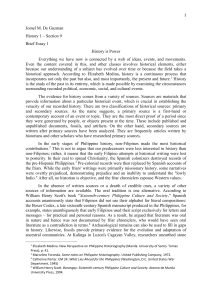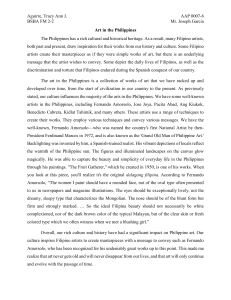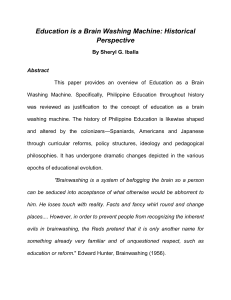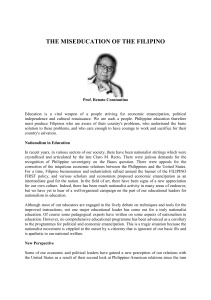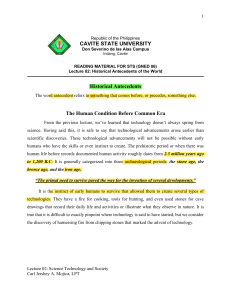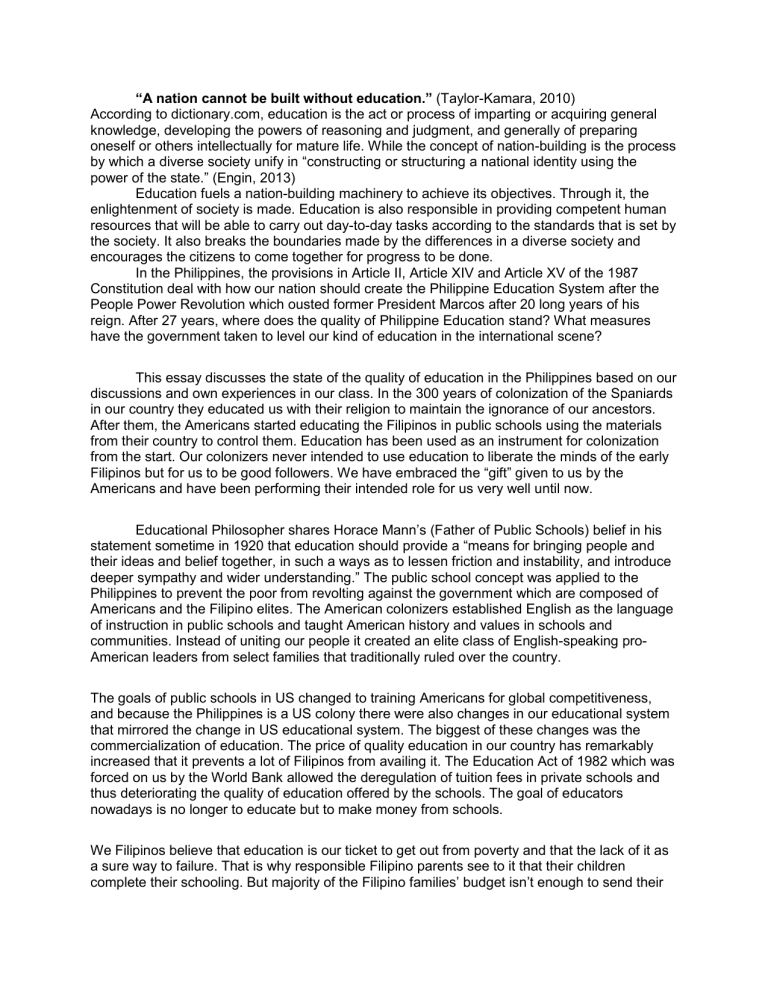
“A nation cannot be built without education.” (Taylor-Kamara, 2010) According to dictionary.com, education is the act or process of imparting or acquiring general knowledge, developing the powers of reasoning and judgment, and generally of preparing oneself or others intellectually for mature life. While the concept of nation-building is the process by which a diverse society unify in “constructing or structuring a national identity using the power of the state.” (Engin, 2013) Education fuels a nation-building machinery to achieve its objectives. Through it, the enlightenment of society is made. Education is also responsible in providing competent human resources that will be able to carry out day-to-day tasks according to the standards that is set by the society. It also breaks the boundaries made by the differences in a diverse society and encourages the citizens to come together for progress to be done. In the Philippines, the provisions in Article II, Article XIV and Article XV of the 1987 Constitution deal with how our nation should create the Philippine Education System after the People Power Revolution which ousted former President Marcos after 20 long years of his reign. After 27 years, where does the quality of Philippine Education stand? What measures have the government taken to level our kind of education in the international scene? This essay discusses the state of the quality of education in the Philippines based on our discussions and own experiences in our class. In the 300 years of colonization of the Spaniards in our country they educated us with their religion to maintain the ignorance of our ancestors. After them, the Americans started educating the Filipinos in public schools using the materials from their country to control them. Education has been used as an instrument for colonization from the start. Our colonizers never intended to use education to liberate the minds of the early Filipinos but for us to be good followers. We have embraced the “gift” given to us by the Americans and have been performing their intended role for us very well until now. Educational Philosopher shares Horace Mann’s (Father of Public Schools) belief in his statement sometime in 1920 that education should provide a “means for bringing people and their ideas and belief together, in such a ways as to lessen friction and instability, and introduce deeper sympathy and wider understanding.” The public school concept was applied to the Philippines to prevent the poor from revolting against the government which are composed of Americans and the Filipino elites. The American colonizers established English as the language of instruction in public schools and taught American history and values in schools and communities. Instead of uniting our people it created an elite class of English-speaking proAmerican leaders from select families that traditionally ruled over the country. The goals of public schools in US changed to training Americans for global competitiveness, and because the Philippines is a US colony there were also changes in our educational system that mirrored the change in US educational system. The biggest of these changes was the commercialization of education. The price of quality education in our country has remarkably increased that it prevents a lot of Filipinos from availing it. The Education Act of 1982 which was forced on us by the World Bank allowed the deregulation of tuition fees in private schools and thus deteriorating the quality of education offered by the schools. The goal of educators nowadays is no longer to educate but to make money from schools. We Filipinos believe that education is our ticket to get out from poverty and that the lack of it as a sure way to failure. That is why responsible Filipino parents see to it that their children complete their schooling. But majority of the Filipino families’ budget isn’t enough to send their children to college. The government failed to provide the right of every Filipino to quality education by succumbing to WB’s orders. In the Philippine setting, the interest that school owners get is given higher priority than molding the minds of our children to be good and productive citizens. Quality of Philippine Education Today. The literacy rate of Filipinos is relatively high compared to the other ASEAN countries. But despite this, our economic condition still isn’t good. Because of this, researchers suggest that our leaders consider the quality of education that is being offered in our country. A group of researchers guided by Professor Yutaka Otsuka suggested several factors that affect the quality of education in the Philippines after conducting their research. 1. There are not enough teaching materials provided by our government to aide learning inside the classroom. Normally, Filipino students don’t get their own textbook that they can bring home. They have to share it with their classmates so they can participate in class. I have experienced this situation when I was still in elementary. We were given a set of books but not everyone gets each book and so in some activities we have to share a book. 2. English is used as a medium of instruction in our schools alongside our national language which is Filipino. But we have over 100 languages in our country which are seldom used in schools before the Department of Education implemented the MTB-MLE program. 3. The number of students in a class shows that there is a lack in facilities offered by many of our schools in the country. I have been in a class of 50 when I was in elementary. And when we visited a public school in our class we were told o expect a class of 70 students. This situation is normal in the Philippine setting. 4. A number of high school graduates go directly to work in the society. However most of our high school graduates do not have the skills required to be hired by companies. This problem is being dealt with by DepEd through the addition of Senior High School in the K-12 program which aims to prepare the future graduates for work. 5. The significant difference between the qualities of education offered in the rural and urban areas. In my own experience in school, I have seen that there really is a big problem in our educational system. I was lucky because I was always in the top section and was given full attention by our teachers, but the treatment was different for the lower sections. Aside from the factors stated above, some of the other factors affecting the quality of education that I have observed from my experience are as follows: 1. The accreditation of teacher education programs offered by colleges and universities in the Philippines is voluntary. Meaning there is no assurance that these colleges abide by the standards set by the accrediting bodies in order to ensure the production of competitive graduates. 2. Every year, student activists fight for higher budget allocation for the education sector. The people who sit in the government make the decisions regarding the path of education in our country. In the current administration, education is not given the highest budget allocation which reflects their position in the importance of education in the present situation of our country. There are a lot of problems regarding the Philippine education system that we need to face but our Department of Education should look at the factors listed above when they reflect on their current policies. DepEd has already taken several measures in order to solve these problems. There is the Mother Tongue- Based Multilingual Education (MTB-MLE) which aims to use the native language of children in their early stages of education, and the K-12 program which aims to produce graduates that are globally competitive. The incumbent government is taking big leaps in our education system which may dictate the future of our country. And in this process they may need to make important decisions to be able to solve some problems. We must not forget to remind them that above everything else we must prioritize the quality of education that the young Filipinos will get. And the government and its constituents must help each other hand-in-hand to achieve the best kind of education we can give to them.
